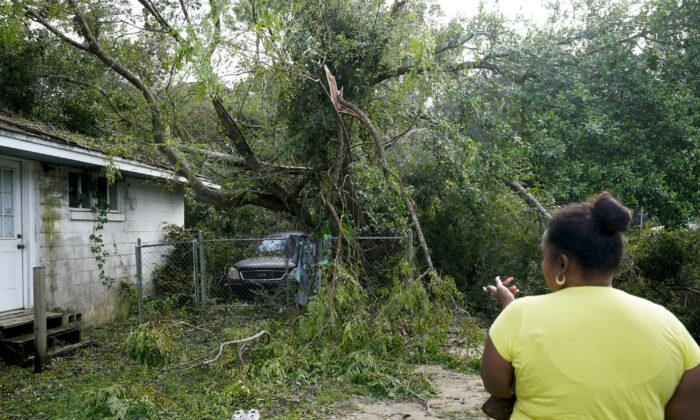LOXLEY, Ala.—Hundreds of thousands of people were still without power Friday along the Alabama coast and the Florida Panhandle in the aftermath of Hurricane Sally as officials assessed millions of dollars in damage that included a broken bridge in Pensacola and ships thrown onto dry land.
While the cleanup pressed on, the record-shattering hurricane season notched another milestone: Forecasters ran out of traditional names for storms after three new systems formed in about six hours. That forced them to begin using the Greek alphabet for only the second time since the 1950s.
In Loxley, Alabama, Catherine Williams lost power and some of her roof to Sally. The storm also destroyed three pecan trees in her yard that she used to try to make ends meet.
“There’s no food, no money. I took my last heart pill today,” said Williams, who has been laid off twice from her job as a cook because of the economic problems caused by COVID-19. She hoped that the Red Cross would soon show up at her home.
Two people in Alabama were reported killed—a drowning and a death during the cleanup in Baldwin County. In Florida, authorities were looking for a missing kayaker who was feared dead in Escambia County.
The supercharged Atlantic hurricane season has produced so many named storms that scientists ran out of traditional names as Tropical Storm Wilfred developed in the eastern Atlantic. It was only the second time that has happened since forecasters standardized the naming system in 1953. Wilfred was weak and far from land.
Two hours after Wilfred took shape, the National Hurricane Center moved to the Greek alphabet when Subtropical Storm Alpha formed just off the coast of Portugal. It was followed later in the day by Tropical Storm Beta, which formed in the western Gulf of Mexico. The same practice will govern storm names for the rest of hurricane season, which lasts until the end of November.
The only other time the hurricane center dipped into the Greek alphabet was the deadly 2005 hurricane season, which included Hurricane Katrina’s strike on New Orleans.
The onslaught of hurricanes has focused attention on climate change, which scientists say is causing wetter, stronger and more destructive storms.
In Pensacola, Mamie Patterson was cleaning the yard of her cousin who was recovering from heart surgery after they lost power in a low-income neighborhood in Pensacola.
Patterson’s mother uses an oxygen machine that they took to an uncle’s home to charge because he had power. She saw utility trucks all over the city and wondered when power would be restored in her neighborhood, where several inches of water was standing in streets more than 48 hours after the storm.

